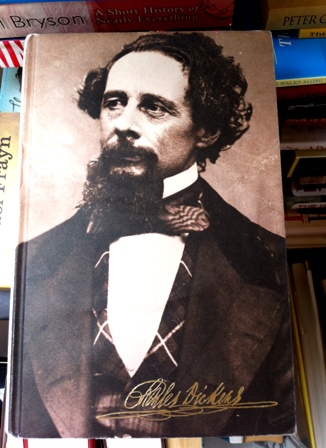
No 19: Charles Dickens: A Life by Claire Tomalin
What’s it about?
Charles Dickens: extraordinary man, extraordinary life. This weighty literary biography charts Dickens’ progress from his early years as a child of poverty-stricken and, in the case of his father, feckless parents to his status as one of Britain’s first and most revered celebrities. The Dickens renown and subsequent reputation has been built upon his literary output but Charles Dickens’ tireless and restless nature meant that his life delivered much more, including plays, performances and numerous social welfare initiatives. Here is also revealed the more complex, less known and less salubrious aspects of his character and his life.
What’s it got to do with leisure?
Charles Dickens is one of the biggest figures in British cultural life, a Colossus that stands astride the entrance to the literary canon warning off as many as he welcomes. Love or loath his novels, Dickens is undoubtedly one of the major influences on literature in recent centuries and his influence can be traced through theatre, music, publishing, tourism and the notions of celebrity to the modern day, to say nothing of his status in the leisure industry as the subject of a number of museums and visitor attractions. Keeping track of the blue plaques marking his residences in London alone could test the determination of his biggest fan.
Why should I read it?
Do not let Claire Tomalin’s reputation as a scholarly biographer put you off. Here she provides an engaging and very readable account of Dickens’ fascinating, compelling and, at times, shocking life. He was such an extraordinary man and his was such an extraordinary life that this biography reads more like a page-turner of a thriller than a heavyweight literary history. Anyone who has struggled with Dickens as an author will find this a much more accessible read than many of his novels.
If you were ever obliged by school exams or literary aspiration to struggle through some of Dickens’ meatier works it is a revelation and a comfort to discover the man behind the literary myth. After so many double periods of English Lit or learned lectures, it is reassuring finally to have someone explain that not every aspect of Dickens’ work is beyond criticism. Here Tomalin is more than happy to provide some illumination to lighten the reverence. His plotting, for example, was often awry. His characterisation, especially that of female characters, was often stilted, two-dimensional and grating. The structure of the novels can often be convoluted and confused, frequently a result of the pressures of writing to the deadlines of monthly serialisation, a publishing format that while lucrative made the rewriting, editing or reworking of earlier parts of the story impossible. Not only does the explanation of such flaws render Charles Dickens more engaging, it also makes his achievements all the more remarkable.
Perhaps the most fascinating of Tomalin’s biography is the insight to the man behind the literary legend. One of the most celebrated, most recognised and most feted men of his age, whether in Britain, Europe or the USA, Charles Dickens was a complex, contrary and often confused character. Money was a continuous theme of his life and, scarred by the childhood experiences of poverty and debt, Dickens drove himself to extraordinary lengths to maximise his earnings. This brought huge workloads, whether as a writer of novels, articles, journalism or plays (it was not uncommon for the end of one serialised novel to overlap with the start of another as he accepted the advanced payments), as editor of newspapers or magazines, or as a performer in amateur dramatics or taking the very fullest advantage of the lucrative opportunities afforded by public readings.
Capable of great generosity, lavish extravagance and, less commonly, determined parsimony, Dickens’ lifestyle, his extensive family and his constant travel compelled him to continue to earn as much and as often as he could despite the complications of his failing health. His fierce commitment to social reform also put a huge pressure on his time, as did the indulgence of his ambition to be an actor, a desire long suppressed by his commitment to earning a living through his writing.
A great romantic who held women in a bizarre reverence, Dickens was also a man of great sexual appetite and a man capable of breathtaking cruelty. His attitude to his wife, his relationship with his sister-in-law and his long-term affair with an actress, likely to have been the mother of one of his many children, can make for uncomfortable reading. The contrast between his attitude to daughters, who were revered, indulged and celebrated, to that of his sons, who were neglected, distanced, both emotionally and geographically, and disdained, is stark. To find Dickens writing that it might be more convenient were his son Sydney, then abroad, debt-ridden and requesting his father’s financial assistance, to die rather than continue to send his father such pleas is genuinely shocking.
Add to this the accounts of Dickens’ relentless and extensive travel, his continual house-moving, his bachelor lodgings maintained a short distance from his marital home, his obsessive walking, including overnight journeys of enormous distance on foot, and his declining health and you have a fascinating, compelling and wholly engaging biographical work.
If you are thinking of dipping into Dickens for the first time or perhaps thinking of revisiting him after the tortures of enforced study, start here.
the leisure manager’s library
An occasional series offering a guide to leisure-related literature
